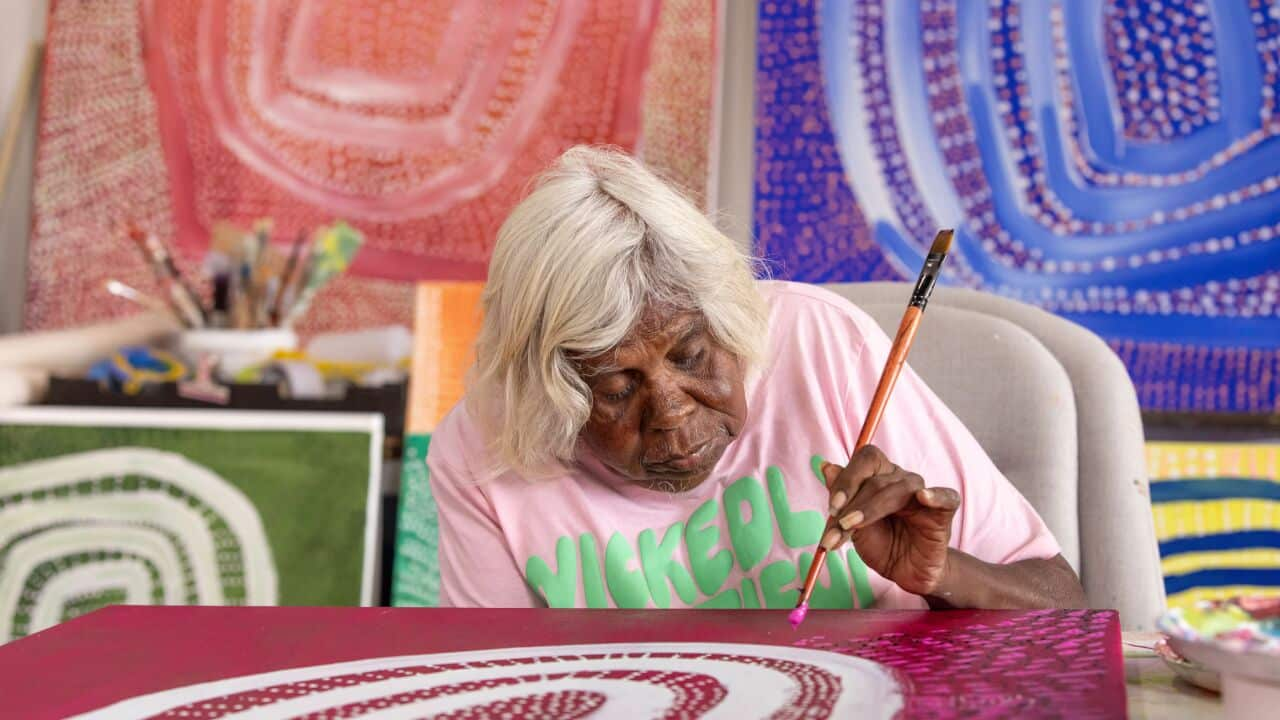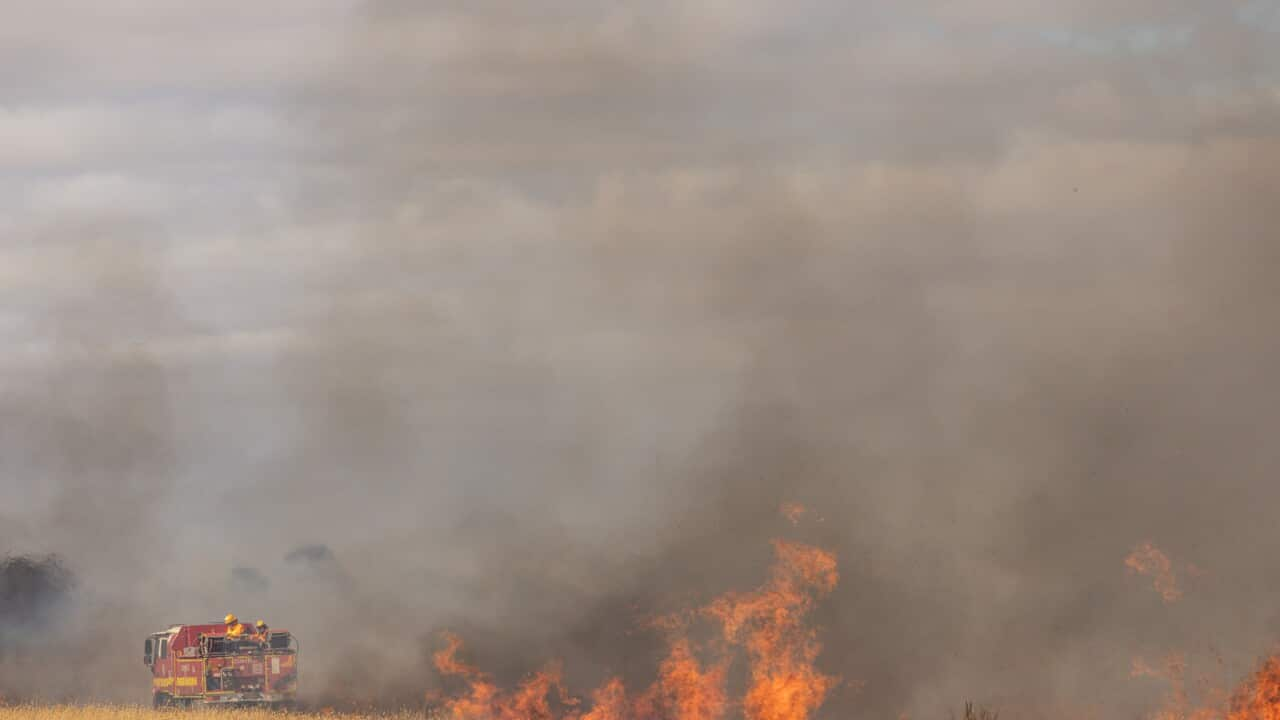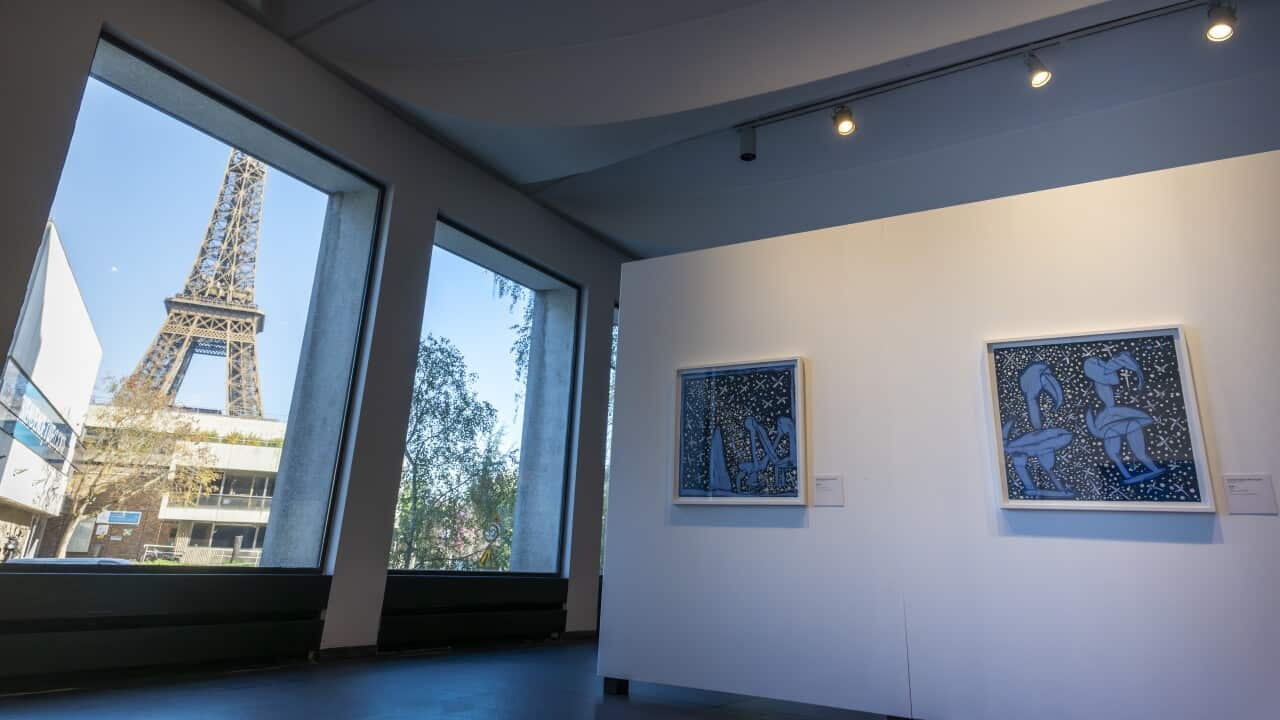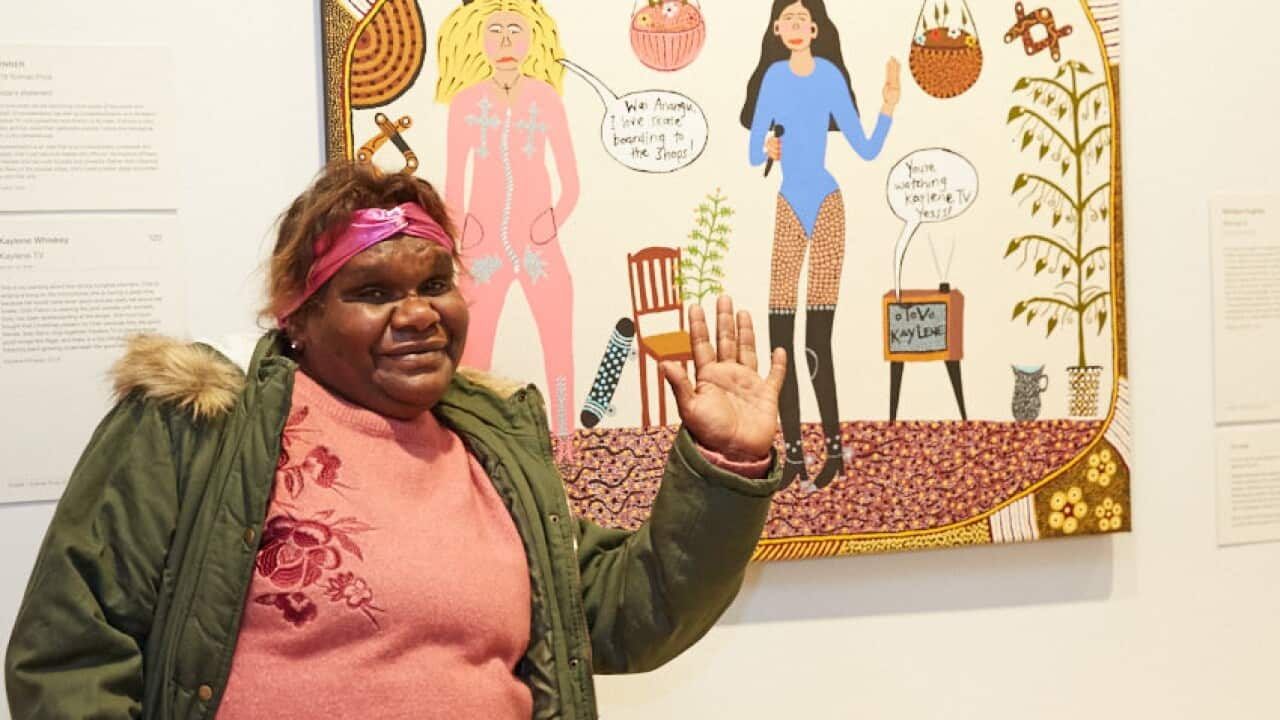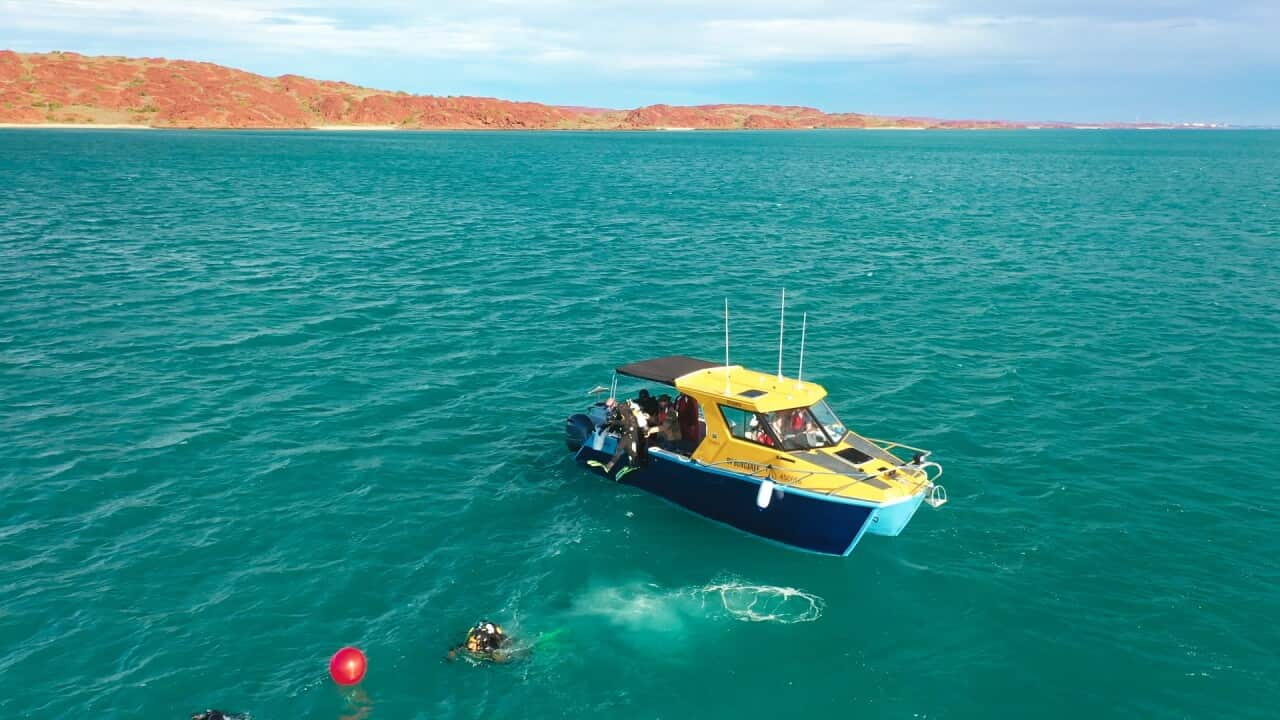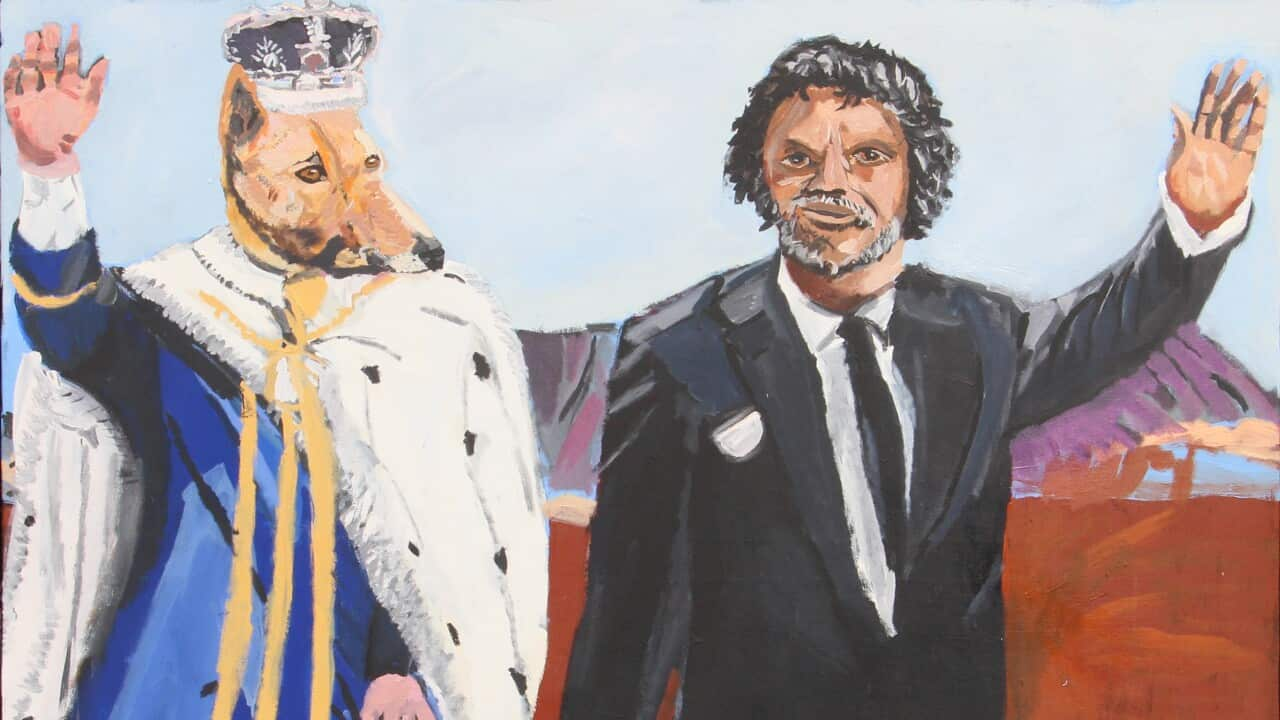Every summer Yindjibarndi people hold a special ceremony at a special place on the red dirt of their Ngurra (Country) in the Pilbara.
In the Birdirra Law Ceremonies, young men are chosen by their parents to take the sacred journey from boyhood to manhood.
The ceremony is held at the Burndud ground. It's a time of singing, dancing, joy and transition that has been maintained by Yindjibarndi for generations and a chance for family to reconnect.
It's this story that Yindjibarndi artist Guurruu Alice Guiness, 80, has brought to life for her first-ever solo exhibition, opening this week, transforming John Curtin Gallery into a mesmerising connection to Yindjibarndi Ngurra.
Over the years Lorraine Coppin, a Yindjibarndi daughter to Alice, noticed that the Burndud ceremony seemed particularly special the Elder.
"She turned into a very happy, proud Yindjibarndi person," Lorraiine, who is the chief executive of Yindjibarndi cultural organisation Juluwarlu, told NITV.
"So when I see her painting – and she paints with her left hand – I can see this feeling coming out in her artwork.
"She says she's thinking about that experience, thinking about all her nephews, all her brothers, all of her young grandsons, all going through this initiation ceremony, and we as a community and family all there to help them celebrate it.
"This is something that no one can take away, she's at peace when she's putting that paint to canvas."
A childhood of Country and culture
Guurruu Alice Guiness was born into a large Yindjibarndi family at Gurrabinya Country near Cherratta Station, and spent her childhood around the Pilbara town of Wittenoom.
As a child, Alice’s Ngurra was both her teacher and playground.
Exploring the land with her nine siblings, she formed a deep connection with the Old People.
In 2019, already in her 70s, Alice began working with Juluwarlu, initially not as a painter but as a cultural assistant, supporting Elders recording their stories and history, gradually returning to painting and dedicating herself to her art.
Her artwork, rooted in her connection to Country, reflects her deep commitment to preserving Yindjibarndi law and culture.
Alice isn't a big conversationalist, Lorraine says.
Two of her granddaughters have received a positive diagnosis for autism spectrum; with neurodivergence frequently being hereditary, Juluwarlu is hoping to arrange a similar assessment so they can help organise more support for her.
"Even though she's got this autistic ability ... you can't sit down and have a conversation, she can't do that," Lorraine said.
That doesn't mean her mother has nothing to say, says Lorraine - she expresses herself through her painting.
Alice's works focus on the Burndud, a dancing and meeting place at the law ground, which she paints in many different ways.
"Lots of family members that she has lost over the years, that she has memory over, and she can only express that through this artwork," Lorraine explained.
"And I think she wants our help in showing that, 'Even though I've got this autistic ability, I'm telling you and my people and the world that this is important to us, the ceremony we have every year is really important to us, we participate in it, even though some people might see us as having a disability.'"
READ MORE

Beyonce takes Pintupi art worldwide
Immersive digital experience
For this exhibition, the space will be transformed into an immersive experience - drawing from the Yindjibarndi archive kept by Juluwarlu.
"We have all this sort of information that can help tell a story, so when we do these projects with our Elders, we add that element in, so we showcase that side of it," Lorraine said.
"We're adding some images, some films, some songs ... using digital media to showcase our culture because, our next generation, to get them learning about it, that's our challenge - our competition is digital media.
"The kids these days, they're on their phone, they're on their iPad, they're playing Playstation.
"So if we want to tap into their minds, teach them about who they are, what's important to us, our language, our animals, our plants, our Country, our Elders, we have to put all this information into a format that the young people can understand, which is digital media.
"The world we live in is driving us into that direction, we're trying to balance the two worlds."
The Burndud is a sacred site, ceremonial oral law and song-cycle central to Yindjibarndi culture, history, and identity, connected to the Ngurra Nyujuggamu – the time when the world was soft.

Alice Guiness in front of one of her artworks. Credit: Marnie Richardson
"She teaches me to remember these things and always hold each equal to the other and remember our roles and responsibilities and never losing the true meaning of the Burndud and why it remains.”
Celebrating 25 years in 2025, Juluwarlu Group Aboriginal Corporation is dedicated to sustaining, preserving, and promoting Yindjibarndi culture.
At its heart lies a commitment to sharing First Nations knowledge through innovative projects, art, and storytelling, connecting communities to the rich history and traditions of Yindjibarndi people.
Juluwarlu’s archive has played a pivotal role in preserving cultural materials and advancing Indigenous knowledge systems. It has also supported landmark achievements, including the historic Exclusive Native Title case in the High Court of Australia.
For this exhibition, Ms Guiness has collaborated with media designers Lightwell and producers CakeWalk Media, using an archive kept by Juluwarlu to show how her people learn their culture through the Burndud, a special place for teaching and learning.
"We work together to help restore ngaarda (everybody), what it means to be an Aboriginal person," Lorraine said.
"People have got to start listening to us now, because you came into our world, and we have been practising in your world.
"Now you need to help us get back into our world and try and make the two worlds work. You got a language. We got a language.
"We've got responsibility to land, our animals, our plants, our environment, and they have a responsibility to it too, because they're living in this world with us so we need to work together for us all to survive."
The exhibition, commissioned by Boorloo Contemporary for the Perth Festival, opens Thursday, February 6, 4.30-6.30pm, at John Curtin Gallery, Curtin University, Bentley and runs until April 17.
